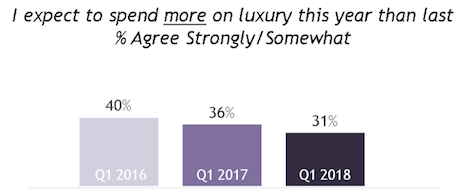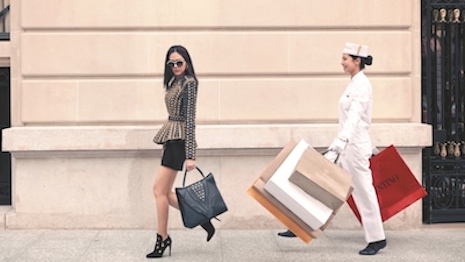After a tumultuous past few years, luxury brands are seeing a boost due to the increase in wealthy consumers across the board, but other factors could affect the market going forward.
The number of luxury shoppers has jumped to 71 percent in the first quarter of this year, compared to 67 percent in the same quarter of last year, according to YouGov. However, the "YouGov Affluent Perspective 2018: Global Mood" also reveals that these consumers are keeping a eye on their spending.
“While there are a growing number of affluent households engaging in luxury, there has been a steady decline in the number of households who plan to spend more on luxury this year than last year,” said Cara David, managing partner at YouGov. “This is especially true among affluent households in the developed economies we survey.”
Affluents and luxury
Despite the growing number of luxury shoppers, there was a 5 percent drop in affluents who expect to spend more on luxury this year, especially in developed economies.
About 36 percent of affluent consumers in 2017 said they plan to spend more on luxury than the year before, but only 31 percent claimed this in 2018.
The latest numbers show a steady decline in growth of planned spend, as there was also a 4 percent drop from 2016 to 2017. In 2016, about 40 percent of affluents planned to spend more.

Luxury spend could drop; Image credit: YouGov.
This is likely due to a decrease in confidence regarding the global economy. Nineteen percent of these consumers feel confident in the global economy, as well as the economic health of their own countries.
The future of education, healthcare, income disparity and personal information security are growing concerns for these consumers.
Despite this, personal economy confidence has been steady of the last few years with a consistent 44 percent of global high-net-worth individuals having faith in their personal finances.

Luxury shoppers are growing; Image credit: YouGov.
However, this could be due to the offset of Chinese affluents’ confidence growth compared to the sharp decrease in Japan, Hong Kong, France, Singapore and the United Kingdom.
Beneficial for the luxury industry, quality is a drawing factor to these brands.
YouGov's perspective
Additional insight
Affluent consumers are seeking to simplify their lives, with more than half of respondents in a previous YouGov study saying they are looking to buy less and declutter.
The biggest motivator for this shift is saving time, as these individuals look to spend more of their time exploring their passions or having “me time.” Consumption patterns have been increasingly moving away from accumulation and more towards mindful purchasing, as consumers seek to fill their lives with experiences rather than material goods (see more).
Affluent consumers today are less likely than ever to feel like they personally relate to a brand, which for many is a major factor in whether they are willing to spend on that brand at all.
According to YouGov’s Affluent Perspective Global Study, 72 percent of affluent consumers worldwide said that they felt there were very few brands that they could personally relate to, with the Middle East being the region where this feeling is the strongest. To fix this, luxury brands need to deepen their understanding of the values and desires of their customers and learn how to approach them in a way that feels both appealing and authentic (see more).
“Fifty-two percent of these consumers believe that it is hard to scale back on luxury after integrating into their lifestyles,” Ms. David said. “Fifty-seven believe that the level of service and quality is worth the cost.
“This is the first installment in a series that delves into the latest insights from the YouGov Affluent Perspective 2018 Global Study (Mood of the Global Affluent), indicating a decline in enthusiasm for luxury spending, which comes as no surprise to us,” she said. “In fact, the mood of many of the affluent feels a bit like 2007.
“While most of the affluent have a desire to continue to include luxury in their lives, the reality is that their declining confidence in the global and local economy, coupled with political and economic divisions, is affecting their attitude toward spending. Many of the affluent are taking a disciplined approach to their discretionary spending.”
{"ct":"WNuLt9oOJ++xr5HwjrqRzLCKPVUs9aaZoAhsQLqCS6lletZ0ye4NwtxpMJYZG9oR9xGqc6zOnrDkMsgIn1lWKzHA\/RK99vI7LGEZMEUqiu61Ic\/tOpxBGFOAVmz6bafaWGTU2p02EcMM3M\/Fm8N+bsvhN5a5HJwHNY0HLYawpM15K5u5nFFdWql4oXU9z+WGACjvPBXMCzBHrvlHbRSFA9HkvmwGzvIEjWmKtf6ct9DhDPEUMsow9Id3jsoksa5KdHd1+Vh8pU5p+ySPZGZivq9QeJdKH0ssyyF0uTK+0kZVL8AJJqz7c9goSfTa7PaSHy7HAlR+F6onK7eDm3g8iqFfCbRYNZm9UY7DC3k9X+6XN6i+qdH1tFLM6tKeW\/qs396atULq7eRwXwMGP089Tw1pp2Yp6tPLF2ShMElgnyzU1jwERpxqCHXcS0oLMhl50+v\/SqYfS0WeC3+9g8gQa1SPP0v05uM4HgfxoZh1gkZBGM520m1Surjd5kGltDx21vT16WAmQoaMLk0LCzaXtnjnIevfddxD8te1mfefC2vadx\/mgtfryxVnGbpGzuRwFZNYNtcXywK5mLfYWZoHf2LZlfCTdKvP+ougDd2dzv+wwHjjGWmGs7OCsP\/Z1ANifUslvFA6ERMIMQzcgOO0zQIFXdcg3VMHuPPmBrUgYfB0bzQMVMBrZUFIiLmOlylnUWAHTelUxQfO5pRGk8bQDrVjXyfsxoF483uDcgNNyWUd6B4fwN9VzX9CwXhKZtBdiLS6\/22ai6cFE3H\/vzpbhZDgKkdNnzZmJ7I72mFy8UvESPpZBNtHLU5DG\/+6vaIxRqo+x+6ZHXsQv+kiIsPHj+6pHBLdo0g3F7lxhQ8ADfnDyN5TA8\/Z9q4bS8PAUxMyiGyR3uXPzv7q1WEjmmz2m8w\/3DO8rh\/vW1a97bLpLtJ6wR0RNcI6COiezjaSvC+y6fq6kfYJzoNc5+m8fd6c+yiZ1dbnwqAEyqgsftrL7\/GS9w8UXTonApl9jWzqzyHT7kNgX8GuYyxXSdab0JL3H5axrt77iiTpZVXPPnTRRKFR4YCmvJjj0Sr7ZMkBf4kddfWh+uP4Tdq1r3pven5WjnQYtR2bssiSXwi2mmjihD6pZGv5L4qMiy6OuXVrZ9tc4VIZFWtTsUbfNuAxU20R7\/CRP0oJj36nNx5vC+m0eisSXNczEr1KZaVqIo10eeE2rM1RTzO4D484v6aIFPwd\/BopmhVs9Ptm\/5lEsIhdFUIt8b7NXf3GmXfcWfm8HcRz7JFEVTiSdi7COn+LTgE\/U8\/mmZ75kC0DNQZ+XYYYZqWzHfGhHBVwiIBYzNT+Ij6x+DM1Xr8a2D32h5qnTmFFQrfdfuFC\/0hxinp5XgPchatx2sZM+ouGrCWcD\/0WiX\/VGxTMp6q\/DvuAzQALXvoy6+GiTtyWGyeR4RjQzmWlU2NEc28UQp\/sbJnClutS+bDnPmtW0wUVlnoBsnnmPIlxYSPLxVxORkLHOewwAmImilHBFgDrGGUKNhHSkRb5V6f5mf48bzCu3lCdyLvp\/8Q3ZVRvqtbi\/GcnM4ww2mX+jo1fg9iaaF7ior0qnuX8EbKOpGMb7X+KbOob8TBzu+0r\/uA4Sk\/J0ar9jjyGxLGemUh8tFrhBVg9fggFVdvjSjTl3v+KjfkaPa4ZVMOtT9CDs0lZBO3ItJWb5T8bA4+wvUY\/iQ8kUMeJFgGGpXv4D6QARwcGr4XXN7OQ72LwpYUpwMUM+roV\/taanFZwkahurfoS4tE0c2W53jAF1GcfhsKLtDThozssx50aWZ\/r6rVzucugURP9mMDRJOkoEOXcFwviuljFrLDupL7\/O6iByYQ7SM+4sNtOAVp\/9l3IM2sGAxRhNhKS6gmHNikJEFRRqoBv3WrjkLnK2gna+V0hhQCguohc2TmuZvPtgCMWuiuWsGpWj+UqhU639D9JvrkccnGpRZFvKMHj6\/AAXlAd4U0pO5Bl6bJUZrs9CKkOs5wIlx5qWcInFux9Kx0pmB1kaoI0rWgKh45CfarMyqswxysj5+2XVh4W+2DAYeK2OR44DLyXesp2UNLhiv4F87TR1WdlaidWSYMTMjyglMuUGHQmh37YmkWepQbKpWrgTSwLvkNrzOhEvZmBHP1Oh8085MxMHyg+HbA87ZXsgCLGy6nwFuTnUEk0LYKGG5M\/8bd2dYwiX+CptQ+WOl4khyK2946zyswMKUsIvHdkOlMDXOs335yfqRgOySM9cmb8z4Hps6+8m1HBEJSQiUTE94UzutThmTW5qwCIetDzZvE6paTCzX2xud0QYDsVCSWW+fw4MZuiTGvPqvs9\/wCfUBHD6063qvwCnH+m6cxYWF9KJpBNcuSMod7oIyvzNjibHGdi4DEtfxtncoLBLeB3wwQpYrNJPTt\/MUtDov9hcmW3lnFyJGfuldi9ZTXNLZU7GLvCJdmGKG+i0P9bCRrUx1jb0fAySjVosaFAsE5X9GZmb+GpXIU26sKXMCriu5IInuiuiaDjSquADP6m9HU4f2p6anap2MAS74QjAUUM\/FGkhEVIw20\/xw8zWQ7TLMFBfKH8rtEERMYeDBOUHKtBIKVfFCT6ME0CqihuXgCovVC4dKKAu1KoqgFBE0\/H7BW5NFsKXtE7EEtR\/mFbjoljbUJ8Mdpj4p7\/7eEPBnarbwV20lot+h0i8GrQ7gF8VhM9R6OVmBEOAtr+Ev7HR8cjnLRR2lpPXnW3GgJ0bDkT6smi2QEVPL6b5IOab7DgjNbfvsEuq2tN5drcJ8kHIa73NJhk+omDQ81SHaYfBkzET6BGopK+QS3fGPI9VJf+GoKs9L7+Y6tFp\/Le+lObsnwTW5zIDXPvgKmQGYGj2xazXPfKofkLJeOosQOZ2N1qTauaFXGHMKEUtOlj0u7BojIQ86bZSg62CkEJiSjm3yq1wU1Oj\/tlz\/z+9TgW1IGNKPkrksWy880JU5E6UdfIaCr\/zydhNka+zd3RQjphHBYmmPZ92x9nLL9NNmuaTKNDw5D1odpegLCdmhIfRq+IZu6JGXvzpL1tSYy10Q5ICZeX4ampRX1kPDc3U09YLzurbLirz1fzpvGcrUlI8TmcPHGpUEk95hIkhN0z\/sAE\/eduQpbEMT7h+6XyVVKQo55nbKl0ynSOR9KDewElOhnyQKKoIR2UT070si7CR7p+edBNgJWy+dzGfXCg2SsoblUFoXlLgNm0RoQYTronYVoGTvG7cNnnjCtJR43SqwuIGOg0tsvYDibwxHlRwe7nyWAh4cDnGliMzvnIkxUW6Rlyyw+7P82kHxogHpFT4fe2zZEnNMqHMJ\/Cg01WgJCq+ewcs1NbAvGHz7j9FXpaG5n3vgDzYlcODaY04tewJhO7P72ZxMOhEMp+yZg46aFwjvlUZEBX8ryRepN8zPrxMwRUJ8mh50U7db3Zywc5vJd3bYCoCq2awssDwZtyYcKqwHCKp0bUxDKFyrlx11dlYd\/ZFJa5aYoFrnMaCcIX0ocGJYfA1wKU7qmT93QCW+7Xs2EH1l4YNCq\/NtI8DJdk1iPI6Bcqh83aAxXpmZdLrCBsMwBNdUl8bdE92lx8RI7TR9klfBJNVmPyCe97Ann5l8yar8\/GZxfT\/WqeiwuBYm1IwOkVnpK8pn\/uYyzInR3b9j8BHltzh66IsSeezFuwe1q8cbx+W1tGRA9JiutpUVyeDQwzW3s4oaBnyjzdNCrzodlRz4UvxEm5zSn5\/ZgEbFLytPV+BZ8YazKvyAcVjWlhWUmGik1kyUgcgtBFvN3fIjFYHm8ZqTHq6juy8UivCFWDLhQUQNbIGZYcCJ2KRa8OVzvKt6SId1m6833aj2r557Wxg4S0+\/mz\/QJAQxSHUcuiK7HTL7QSMV8HFHbhLRIbECd\/1HBF0W97t2WKDk3P86bgTdHUwF8HHJhqQzvLIlt5+3f7yfzHEJMIQMy0SkTH1Q0odGVtF1mvB1syPBXNQ\/xT8M8hUYn8RS\/6Pt5MiY4Ejy\/bojHED+j0HrIYUllQ\/rD4odAgwVrHxqIGX86os38K78YFteckPnymIKcjE76\/c+1yERrAPZuMlGy3rtGOWHKnw1StBOIHl\/ijyBcjM0tCioghPNqv6juxHeOD6Kn81kqpRVL\/k7VVSxK7RMjP7frcOs3xYlx7t\/yuIVPokZXhOQEUEyUK2\/uLgrefMci4KqAyBAtjtU0wsJY9Yi3+1YBJjZ9CTh3KSvzq1bBlz7HBYEUiuzh8Tsw\/ibRlXtyWP\/bDcevcEOIohGldLT\/2ocm+j568oO3Hs\/lbboj84l+tDczHVL4rJskH9vR+xJ1dWWKoG+PgvZ8GIqGDbs4NMPb7abG+HrYVFKY5BWE7Q8uhiC+wtQwXrY1Z1tfIUrq53gIepNQ7ziBk05kTiihrjkZwLljpB1efR0rriOmKrZp\/xSVSgv7hLB\/vWpXMCA\/R24AT+LKOY1tRmqFQh1wHjWCFNqUWzGvkByj+1cu8WdSCxwMEkZj0da9PZUkTS9HG10wc1PMkYsvJGH2cTDwpkyMF\/bkWrkNApj2vPxNlcpQ4Zad8NlZDmVdn6oQbSL4YFG79LCPBQpmoaL\/d3UaoJ\/zLW38wVF06JgjpcAMuAe3vBpBVNuR6bfUleU\/uMqNisOioaWCefiPGonJ\/6+2LZ6vZTwmMABJG1OjheSK21BwTwyVdOBOrSyhsK\/TXEbpAiPC6uDqZkERR4CkTJzoIBQbwJ6h85dXwpNkLDJBPWnXSjmlkGogiQIes6xqMIUsVbGRj1dKenp5OUzSpUXUVuhWWDlzfJxitq7nFPnd6EXD8ENJfzKhoefXmxPGciSkyK3lbaldMm6f0MEaqO1+6Jw0GuznEm5QuxNv2hTyCXzYh+xCpG3qW7iTWPisRUiAsfWI9lNTvVuwCfC9YMNfQnQezvQ4WDPT6jVDPxttB31P+4vmiyVxddElASwkR3AJCR9xCsB6Zj2EgTNnI3NC8SJpNKmwRZTX9Dseorf2fx\/p4r1dNDTILwOdDecx3Cd8dRmkX28pMwZ6cYCWZP2VplvX++OuuiFdMEaWuNjS1f0R02VctrkXJWDg\/sNyzsyUJ27JAYagSwb3mfOTJ37w3ubO3PC67R2kA5KpntFpo52s3fyYNIoPIUha8CjOh1Ok5eFuEt3Gt2BBEIAX4c+FHpNi3HDt1qh06TTt2p3OwfSC8vlOrd1PkRI+a+jfQ3CxEH0s674dI8EMzk9NdeDw0\/ry2CDIZ1GbObafV7np00lt47KUr3pkD9eARd1p18WEedxx8uM8sK25D+ro\/ePUKfOD9FhEE+36u\/t8R\/9f1aJ01JG+dfRLWa3DcBAefF0l1wePAZz6esEO6z\/xBRtyVx+Wl4VcN9RmhETksLr4UE7W7\/OUsgVNyDUfCypY7uapRDBg7Zy2IviCD8IWBJi55ye9KltUI4H24fNnAVYwhrea5IMg\/Ivdwv8ELoZ3b8ike2GxtlIkdHUYb6dKMFFMH+MX22J8\/0jHZzRg36OPn4bx2MY+sBQmw8m4U6z7GdHfNtWRU8gMTJYztGFc28Ach3PjY5Y6QVQD9BSsdoW8Vrg2LzsfuhIT9bOlvXYBx7zJCLRW+dNfvIpsL24mzH2C70YdIdo88u0n5DtmFdpRpuHOkytih5JYUoWZxSfF+JhsqaY9owof7xTyDQOWmUskjagjLCwsgsCk8kcthvcsRrtHe0EpSFxId3GqkRZccVfvMYBUDRX1mj\/PgzqZOpoGOvhYcmaUZIaiDYdqMBrsH47aSI8GqssVdwRooXG+ghXAXc+TszPaJAv6YDBTcrR4DWGI5ZRtXNrU\/rYbRMW2WzE2R9WZpoogFJ7l23DWaUANppAymNTmX9nI0ttFrGNs6xi5v9+qYj0p9zQ87gRFrUrpDupBRnjwlsrz\/wnoPaqHGYBr+iGB90oB\/6TY0EkzVol9QFN7ErGLfD7rMRanIpG2i59ybJ7vlEACUvWbOF8HJ6DbrE8B9OZDwrzdVrV6mESu44FCiGpVfpEz41P8P5zPPgrLKUD02nPGDaB5poKCG3L2sgbEQ+W534FGClctu9K\/ezQovHsDstjQqCFUMqokrtJfMhHScmGsUm5VtbG2DMr84Zq3QUk3wTNVQSmVd76CPb6sxP4tRIIu1QdhAe\/0w4+I3d4PjQFjZOn0wOQCNVqhXrE\/KUBfNBcDjYIBR3\/avgUg9MT90cVrh4OiUGuiETdkE8CsRUXnncZau1kWbuD7OqVQBW3yIVpR\/BPvM3b75yhL7VtvzrctubSK4FGuNtW7aQymp0+ao4oG4q\/pkpqS7lV01S+osJZY9pZk\/yIL6+XO6bor+V0En48VNptLTB\/TK28mYaOOj9Oz10h8QUhX3nhrs3InQPKuz4DL8mI5yk6gBtsnBzahOpsxT3m2xNe9BB9pzhTG+Ouq44skBikZaYIhy65\/ft0pB2QHWymyLSZ\/y2y7IA8sTLHhBAEK1ba495Vb0W3JGsRLPv1XxsxVj++aBAPGM+oY7jfCK7i5uOFbPZ9tb+PHiS0u76BqD5MW8dzLOOPNdZAeYDICCYtw2gL9T6hu8zwEhRwBf4XCC8XqTRgUj7Qp1HYy794uiaUhzdGU\/RKb+dVenNM+X9rVWZMID14FMdsisUykMwfMoSnmpxn+dMvtO9ozHPE9I2lxlFWj3aJ8tP60\/sNwwoGBSaQS1duKBMlUqHxDB\/8\/zJjxGwwmaOqu0Idz+WEs83AHGubQUnlZx7DLoUcY6aOYjluWDzvWreEFSBw5THFRr\/u4WxJOJ7DWRDjEf8zQsg2f74KuNWdxE\/kpsB2VdvZM5qpo9Gugm8Al9YvNFmh35LhTNmy0qSSSUUrZj9xxcKqJt1oZfp1uwBknrGtrvDCXc3m4hH87Cy3ybqaxmdvhFHHddmRSY4oiAu1q5\/9OdRmJzS8x3HwS2+\/y68utuB3lr+2DO7s4XfNZJUn6ZT8fAi3Sdlra3gF46O6V\/uM+DE7BpO2TTmoPMcPpyA\/FboyvPFYp1r9gJ2ygB6UxcdFPyp+WA7SuDAa73mI0i5E3iASXVlQLQ+Z2MWb9KgRodXtqud3NKKhugpVwQ3dIs+6YP2gUssBV83XaBCUK2pTMBos7B95D7pbuUNSnhWN6EpFjC3\/BxvMGgtThzrHsm4bhfLbhcL3K3LJtL75XIXkdhEBqXhJnD7Zl3n8C7tWk1FycxwMBat116hUBbgqUa8LoYPbkXGzI\/D0m8c16zYXEIy3HnsK2+4RssF\/Q\/Mlet0j0GZs9qlbZDnte\/oBHaPKbz2kWcPWBkoFS1++HZds8MSXdXBPCmFW4AeZbF0mE7vkBypx0HH60yhehqVjexLmb+VCWB6nvkuxMzHicRWhSd9R2lmZy7Y9pGtF996De+FeO36w0smTbQHhSiXyx1Q55f0tu6EYunUtqrWwn+3lqUZVuDVMmZt+WZGTrFMl27\/QAfG4eGeboZ1kjkt0rixqR+8rWE2YezgUqIlZPnGCK9xSZLSxLBLw==","iv":"689c86591149ad6b68d7f60cfee92c1e","s":"61fd80b65b370f24"}

 Shopping has now become experiential
Shopping has now become experiential